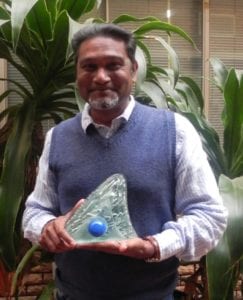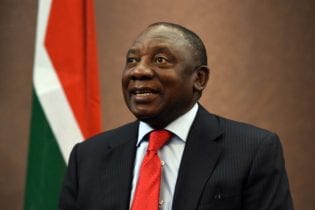
Dhesigen Naidoo, CEO, WRC
On 30 June, during the Prince Albert II of Monaco Foundation’s 10th anniversary gala dinner, I received – on behalf of the WRC, the government and the people of South Africa – the prestigious 2016 Water Award for the WRC’s contribution towards a better understanding of the environment and its outstanding work in South Africa in the field of sustainable water resources, water supply and sanitation.
His Serene Highness Prince Albert II of Monaco handed the prize over to me at the Salle des Etoiles. The foundation was created by the prince in 2006, and it is dedicated to environmental protection and sustainable development, with focuses on climate change, biodiversity and water. In 2008, the foundation developed its awards programme to honour key international figures and organisations for their exemplary work within its three priority domains of action. It also offers a tribune for raising awareness, supporting courageous ideas and recognising the work accomplished.
The calibre of the other recipients shows the illustrious company we keep and also reveals the weight of this achievement.
Laurence Tubiana won the Climate Change Award, as the special ambassador for the COP 21 climate change convention held in Paris this year, while Luc Hoffman was honoured with the Biodiversity Award. A pioneering spirit in wetlands work, Hoffman played a central role in the development of the Ramsar Convention to which South Africa and many countries around the world are signatories.
The idea of the awards, in general, is to recognise the achievements of people who are leading in these three fields so that they serve as points of inspiration to the rest of the world.
We have a water and science community in this country that we should be proud of. It is small but highly productive: South Africa currently ranks 18
th in the world when it comes to scientific output in the water domain. This is remarkable because there are many other countries that have much bigger water research communities that practise in this domain, so we are clearly highly effective.
As I mentioned during my acceptance speech, the global deficit on access to safe water is – according to Unicef’s latest figures – 9% or 663 million people, and dignified sanitation stands at 32% or 2.4 billion people. In addition, the Food and Agriculture Organization says that, in spite of our remarkable efforts in the last 20 years, some 780 million people – or one ninth of the world’s population – are still food insecure and live in hunger. We also know that the vast majority of these folk live in sub-Saharan Africa and South Asia.
Additionally, I explained that our country enthusiastically signed up to the Sustainable Development Goals in 2015, with the target of universal access to safe water and improved sanitation and possibly an end to hunger globally by 2030.
The WRC, together with its partners in South Africa, Africa and the world, has committed itself to being the research, development and innovation partner to help make this possible.
We, as a global community, must use this thin-end-of-the-wedge opportunity to invest in a leap-frogging strategy, facilitating a greener, more climate-friendly water and sanitation revolution; one characterised by:
- fit-for-purpose water use, encouraging reuse and recycling
- point-of-use and decentralised treatment solutions with concomitant energy production
- dry sanitation
- waste beneficiation.
This has the real potential of low or even no external energy input, moving us collectively to a lower carbon economy. This is done with a genuine belief that what happens in sub-Saharan Africa and Asia, over the next 15 years, will determine the character of the global carbon economy for the rest of the 21st century. It will fundamentally determine the climate change scenario of the century and beyond.
Africa is en route to becoming the highest populated continent by 2050. Some 70% of these people are likely to be urbanites and at least half of them will live in 50 megacities that don’t currently exist. This provides amazing greenfield opportunities.
I’d like to express the WRC’s sincere gratitude for both this recognition and opportunity to share with the world what we consider a vital toolbox to ensure a greener, more climate-friendly, more biodiverse, sustainable future. I also invite the global community to the laboratory that is South Africa, Africa and the developing world, within which we can, together, construct the embryo of the world that we want to see for our children and the generations to come.









